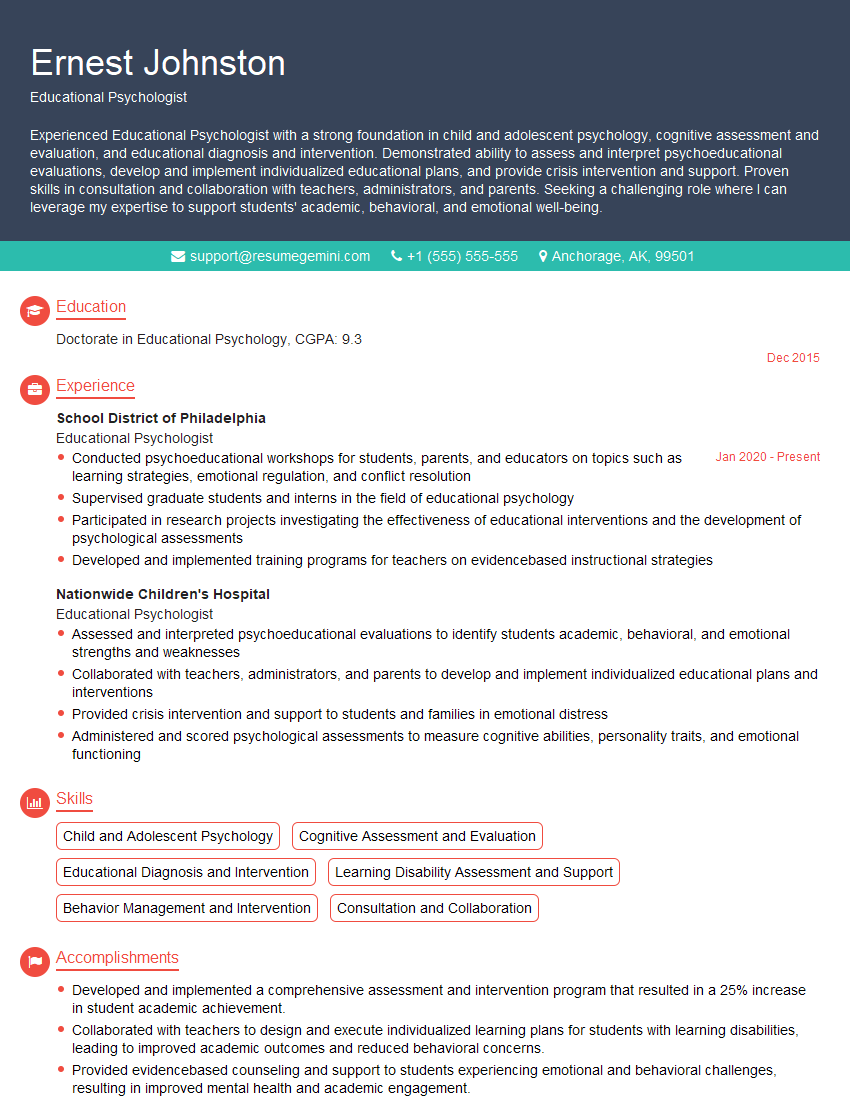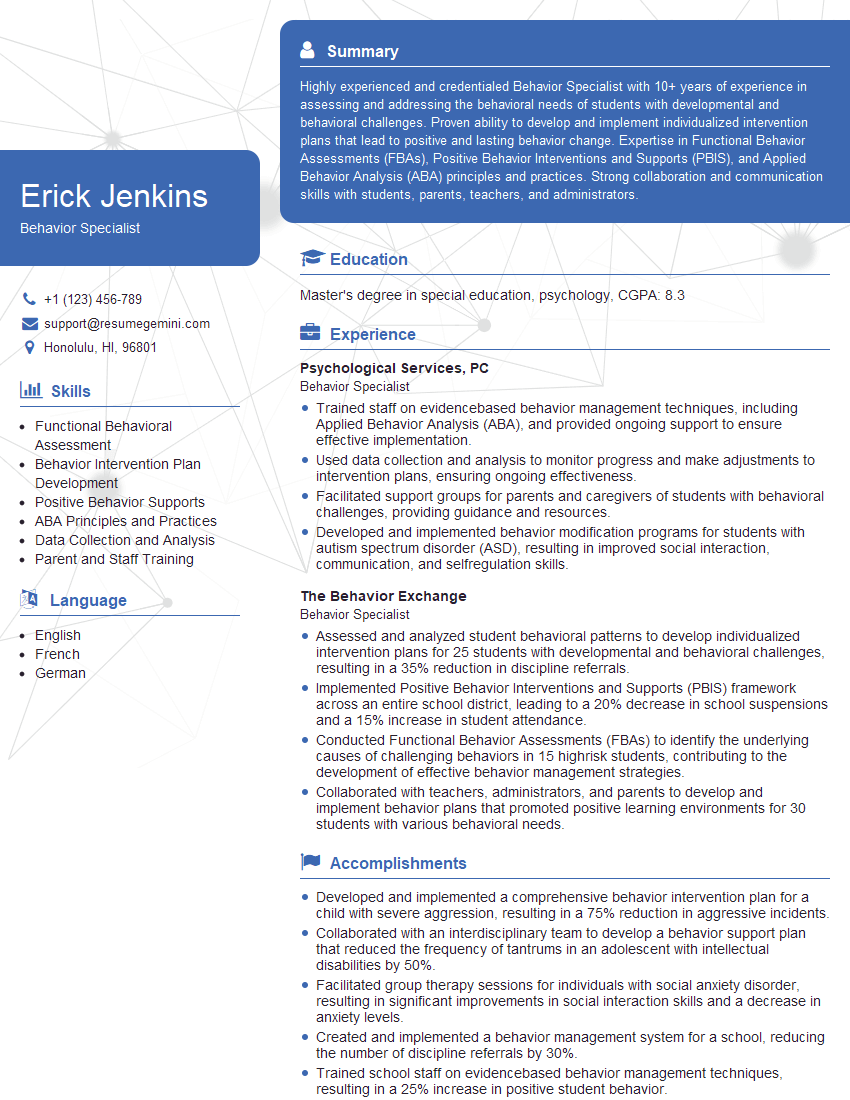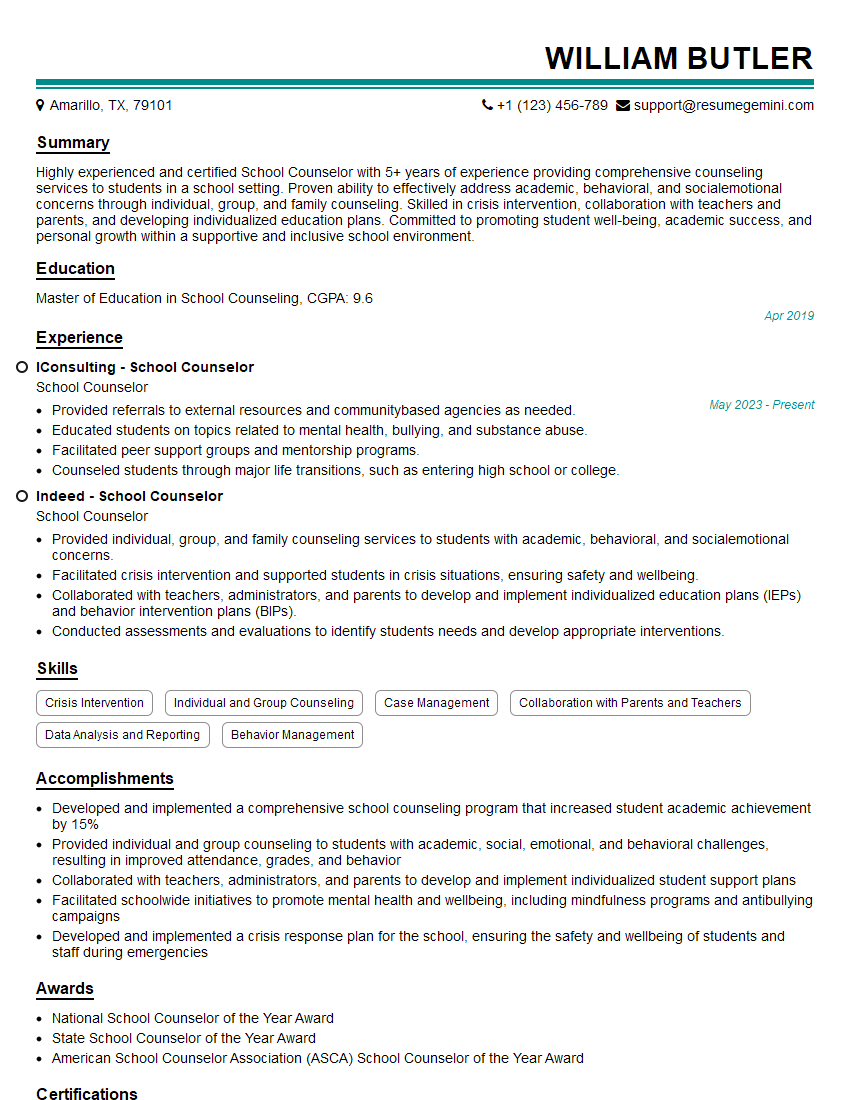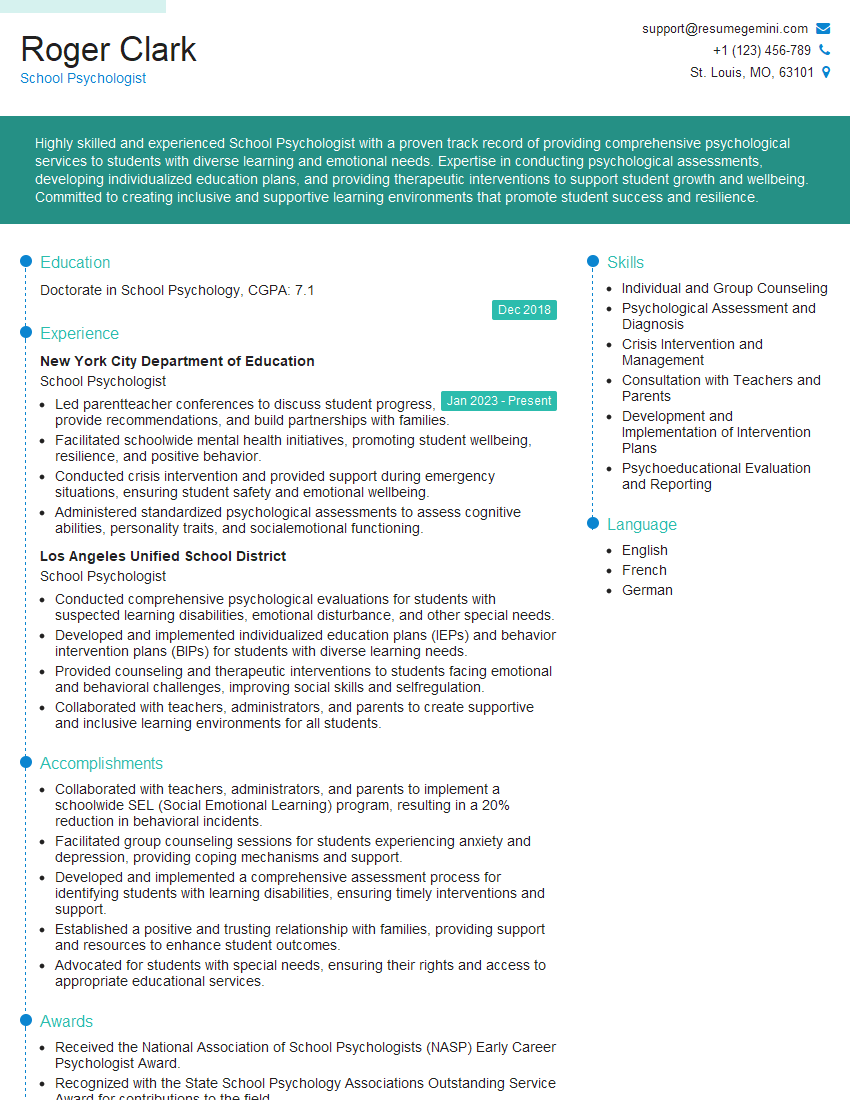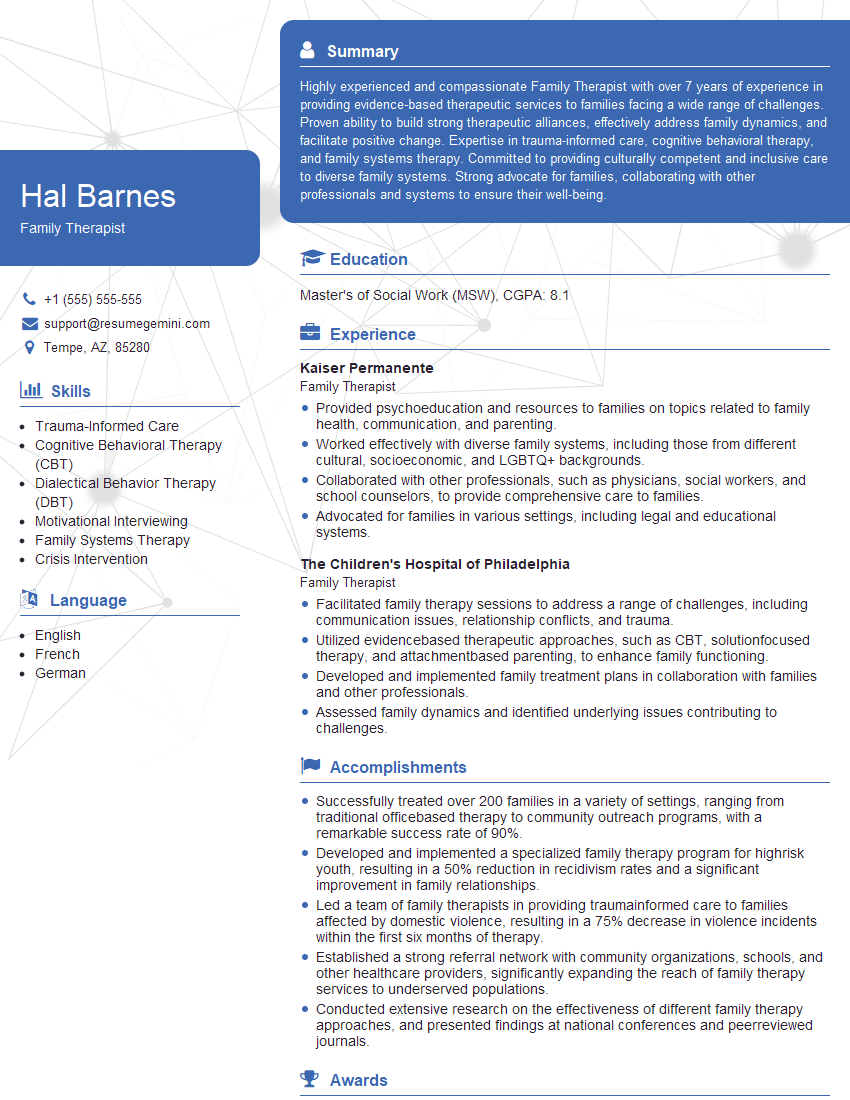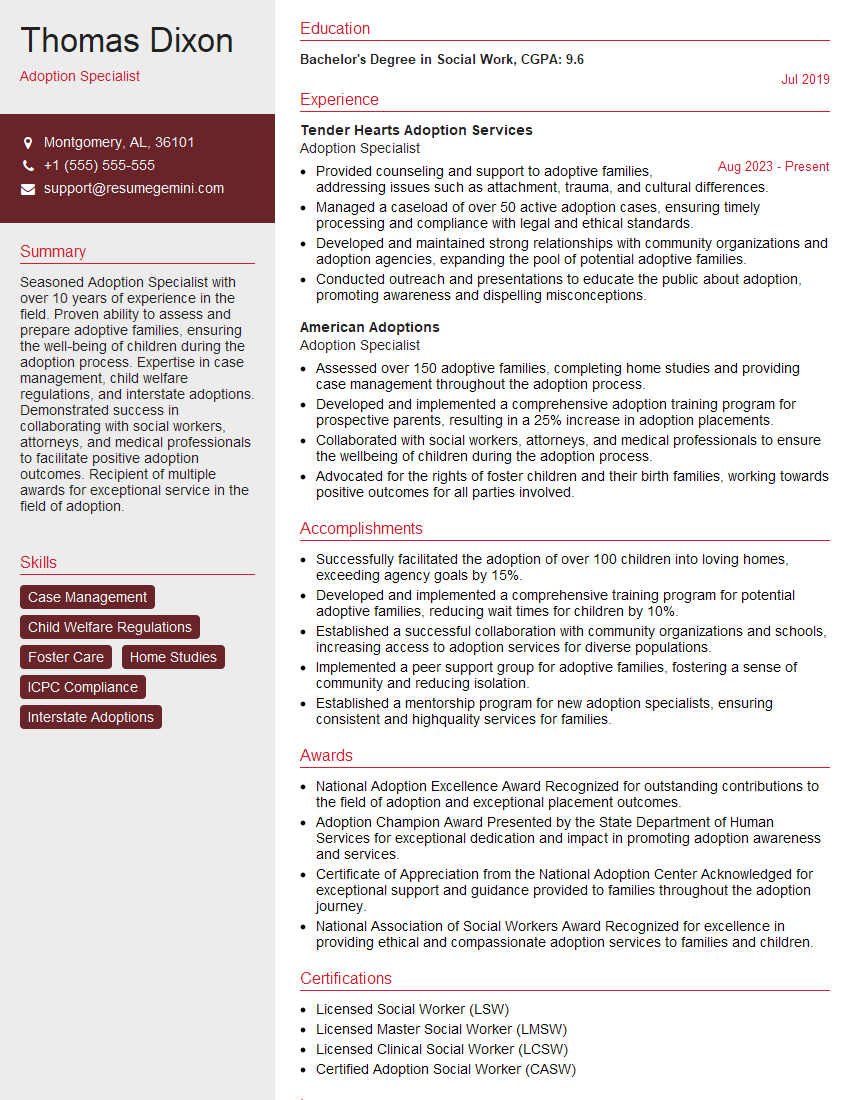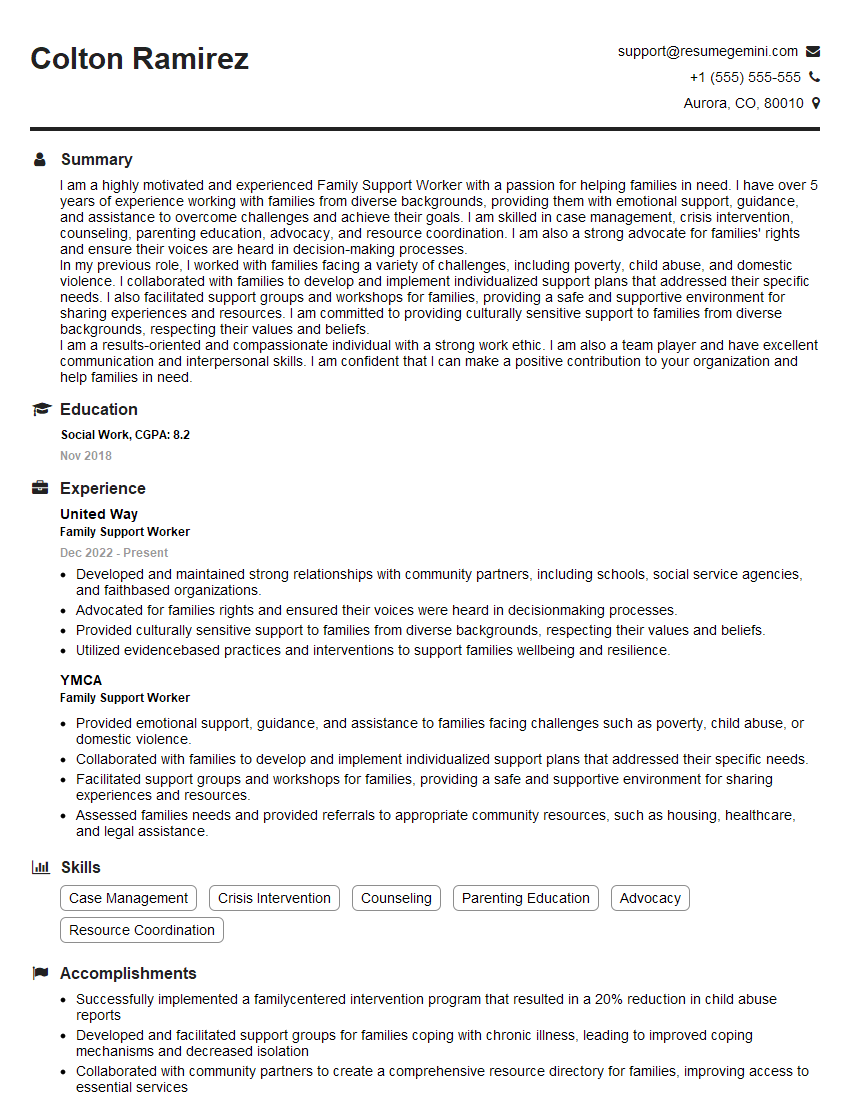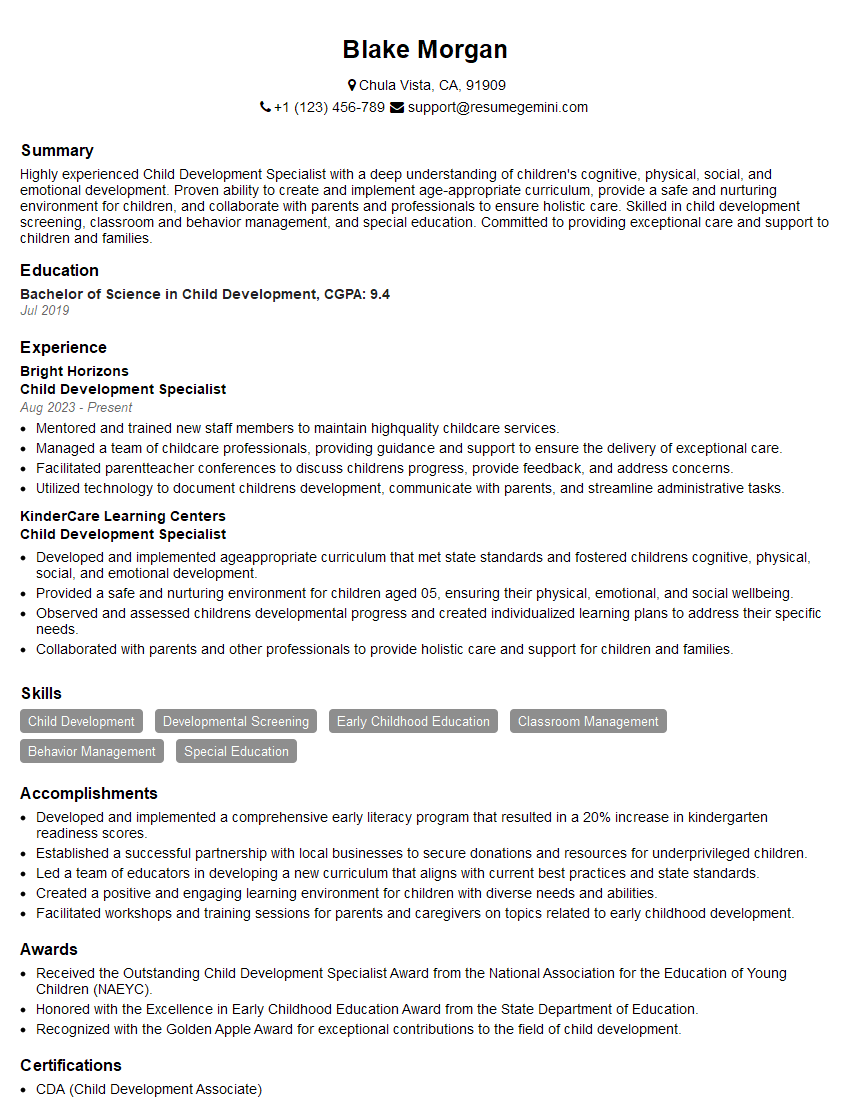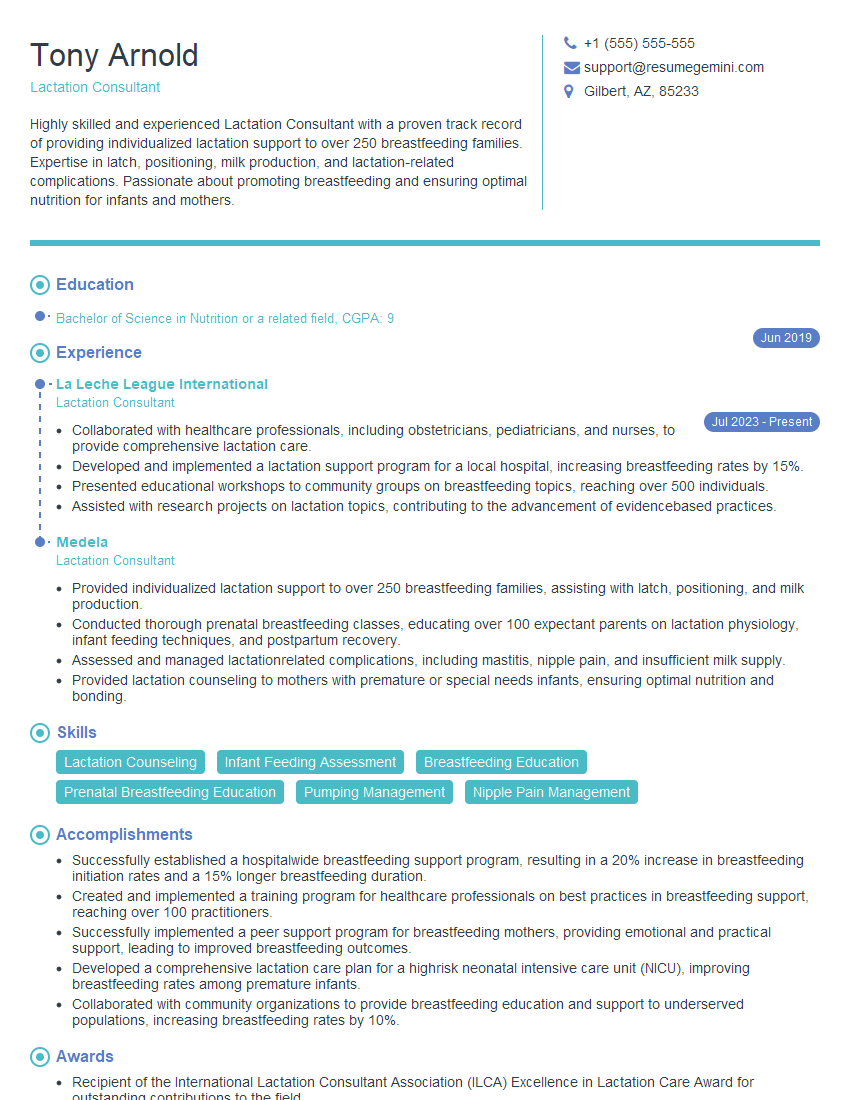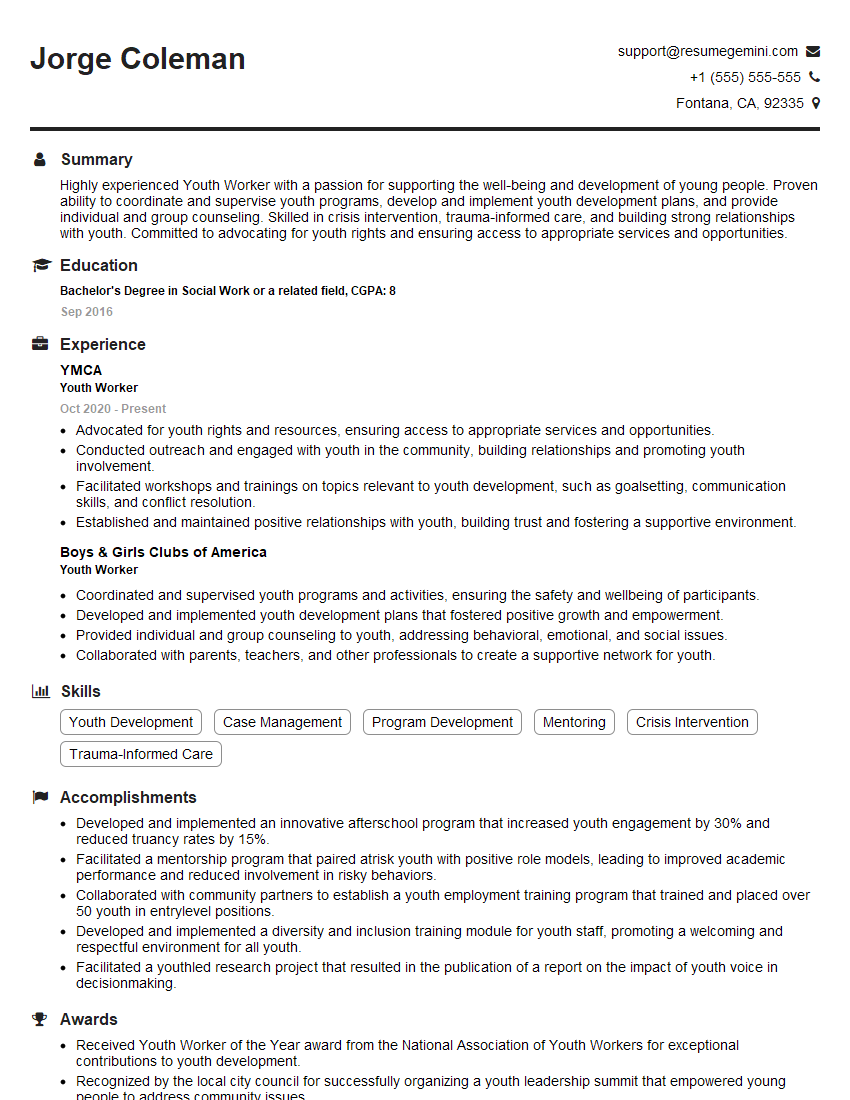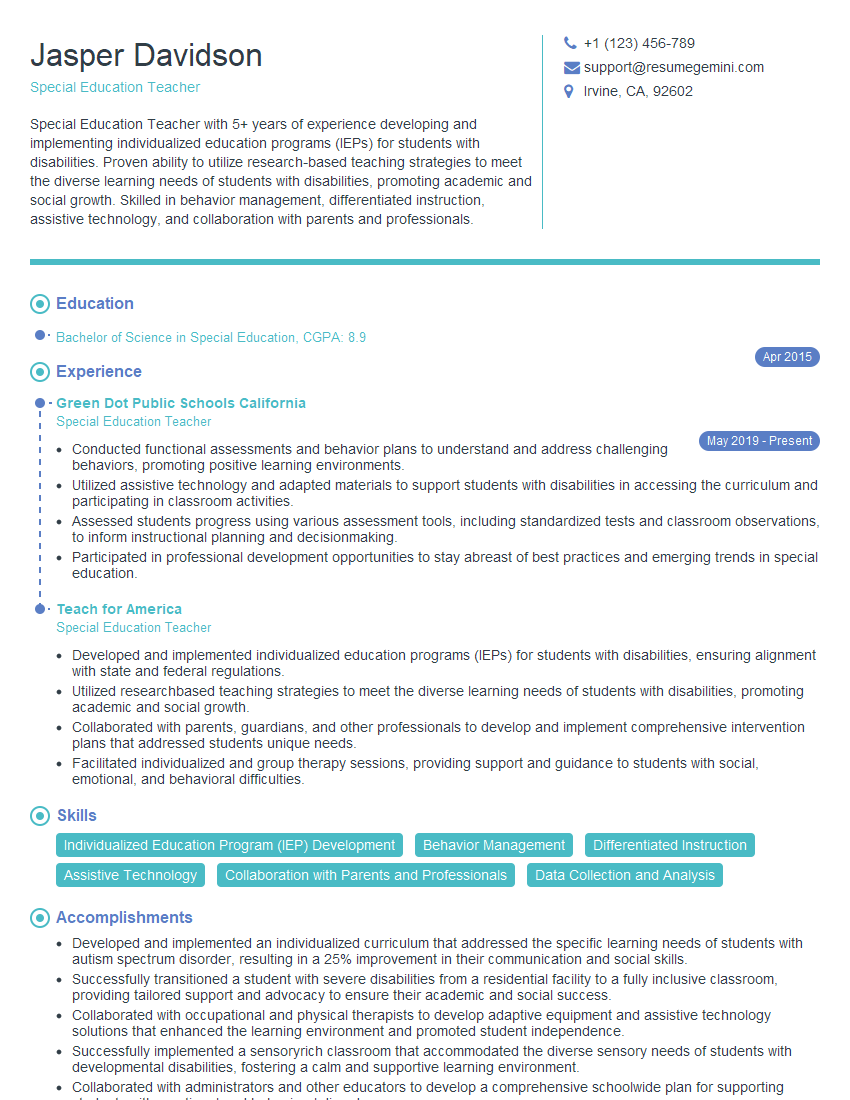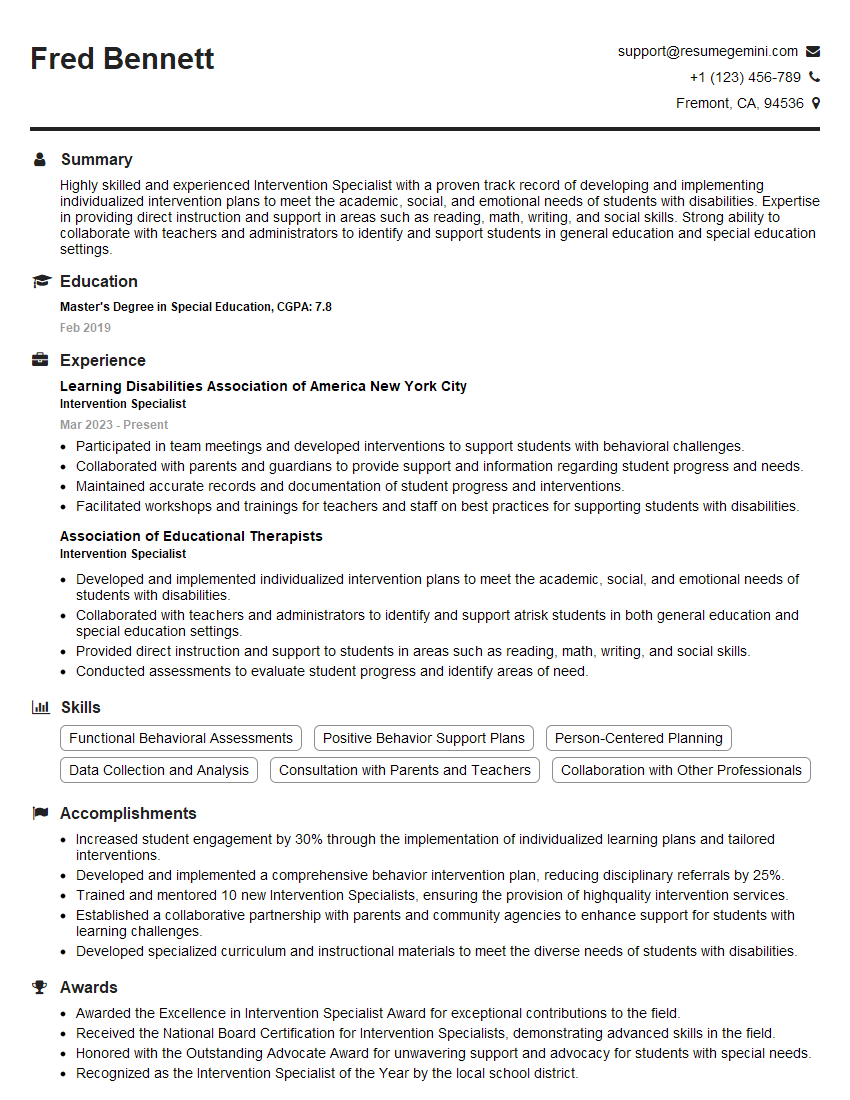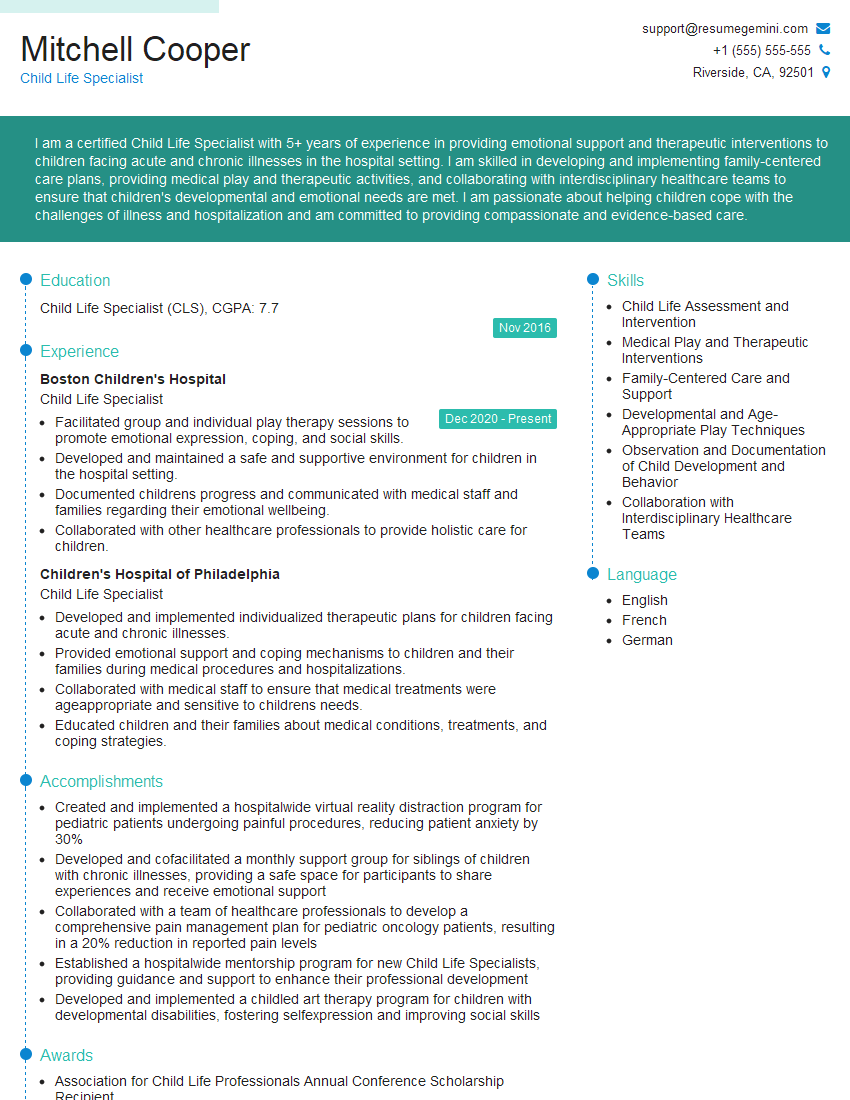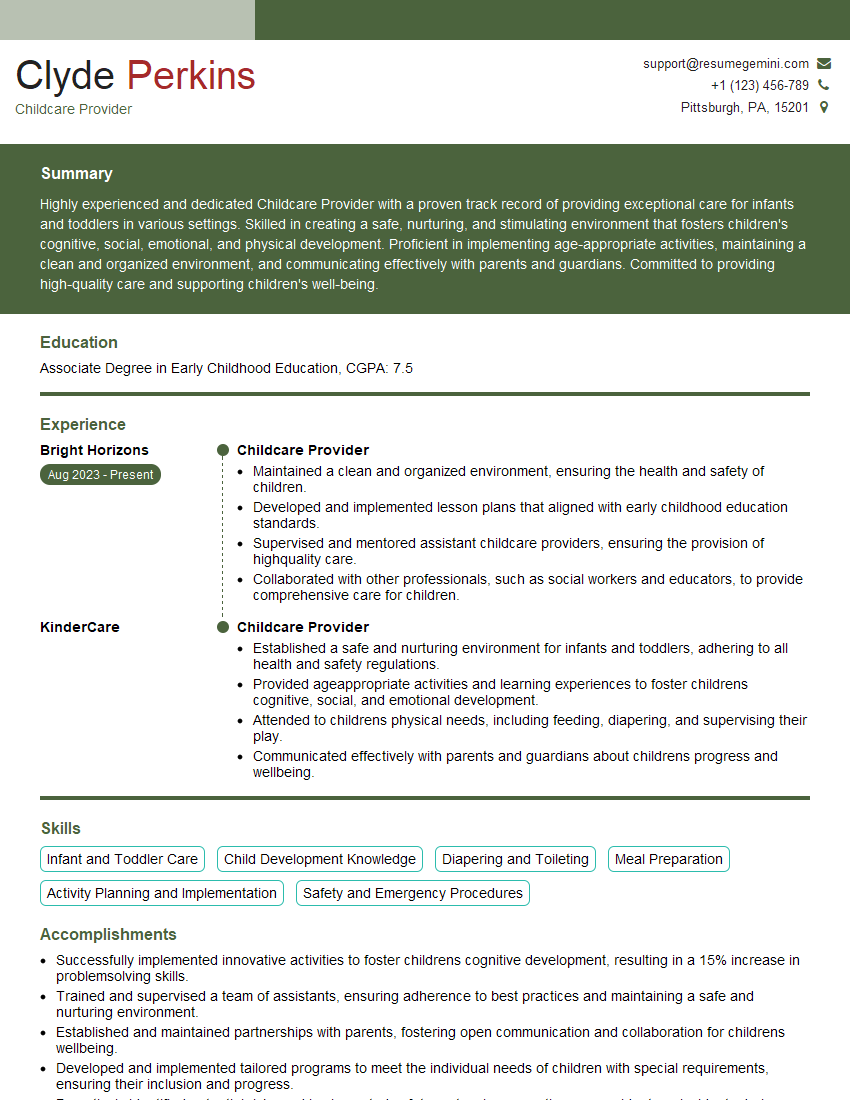The right preparation can turn an interview into an opportunity to showcase your expertise. This guide to Education and Support for Families interview questions is your ultimate resource, providing key insights and tips to help you ace your responses and stand out as a top candidate.
Questions Asked in Education and Support for Families Interview
Q 1. Describe your experience working with diverse family structures.
Throughout my career, I’ve worked extensively with diverse family structures, encompassing single-parent households, blended families, same-sex parent families, extended families, and families with adopted or fostered children. My experience has taught me the importance of recognizing and respecting the unique dynamics and challenges each structure presents. For example, I’ve supported a single mother navigating the complexities of balancing work and childcare, while simultaneously providing guidance on fostering healthy communication with her teenager. In another instance, I helped a blended family establish clear expectations and routines to integrate children from two different households. Understanding the individual needs of each family member within these diverse contexts is crucial to providing effective support.
Q 2. Explain your approach to conflict resolution within families.
My approach to conflict resolution within families is based on a collaborative, strengths-based model. I believe in empowering families to find their own solutions, rather than imposing solutions from the outside. This involves several key steps: First, I create a safe and non-judgmental space where family members feel comfortable expressing their feelings and perspectives. Second, I actively listen to each member’s concerns and help them articulate their needs clearly. Third, I facilitate communication, helping family members understand each other’s viewpoints, even if they disagree. Finally, I help them collaboratively brainstorm solutions that address everyone’s needs and lead to mutually agreeable outcomes. I often use visual aids or role-playing to help families understand different perspectives and practice new communication skills. For instance, I worked with a family experiencing conflict over their child’s academic performance; through facilitated discussions and identifying each family member’s role in supporting the child’s academic success, we collaboratively developed a tailored study plan and improved communication around homework and expectations.
Q 3. How do you assess a family’s needs and develop appropriate support plans?
Assessing a family’s needs involves a multi-faceted approach. It starts with a thorough intake process, including interviews, questionnaires, and observations. I utilize various assessment tools, tailored to the family’s specific circumstances, focusing on areas like parenting skills, communication patterns, family relationships, resources, and environmental factors. For example, if a family expresses concerns about their child’s behavior, I might use standardized behavior rating scales alongside interviews to understand the underlying causes and develop targeted interventions. Based on this assessment, I collaborate with the family to develop an individualized support plan, outlining specific goals, strategies, and timelines, ensuring the plan aligns with the family’s strengths, values and culture. The plan is reviewed and adjusted regularly to ensure it remains relevant and effective.
Q 4. What strategies do you use to promote effective communication within families?
Promoting effective communication within families requires teaching practical skills and fostering a positive communication climate. I utilize various strategies including active listening training, where family members learn to understand and validate each other’s emotions. I also teach conflict resolution skills, focusing on assertive communication techniques that avoid blame and foster mutual understanding. In addition, I encourage family members to schedule regular family meetings, creating a designated space and time for open and respectful communication. Furthermore, I introduce positive communication strategies, such as using ‘I’ statements to express feelings without placing blame, practicing empathy, and actively listening to each other. For example, I’ve successfully implemented family communication workshops with groups of families, providing them with tools and strategies to improve their interaction style.
Q 5. Describe your experience working with families experiencing crisis.
My experience working with families experiencing crisis has highlighted the importance of providing immediate support and a sense of stability. Crisis situations can range from domestic violence and substance abuse to sudden job loss or serious illness. My response involves immediate risk assessment and prioritizing safety. In such situations, I often collaborate with other professionals, such as social workers, law enforcement, or healthcare providers, to ensure comprehensive support. I leverage crisis intervention techniques, focusing on helping families cope with immediate stress and developing short-term coping strategies. In addition, I connect families with community resources such as emergency shelters, food banks, or mental health services. I prioritize creating a trusting and empathetic relationship, making them feel seen and heard. For instance, I once supported a family dealing with domestic violence, linking them to a safe shelter and coordinating with support services to provide long-term emotional support.
Q 6. How do you build rapport and trust with families from various backgrounds?
Building rapport and trust with families from various backgrounds requires cultural sensitivity and humility. I begin by acknowledging and respecting their cultural values, beliefs, and practices. Active listening is key—I make sure I understand their perspective, avoiding assumptions or biases. I adapt my communication style to fit their preferences; this might involve adjusting my language, using interpreters if needed, or being mindful of nonverbal cues. I also strive to understand the family’s unique strengths and resilience, focusing on their capabilities rather than their challenges. Building trust takes time and consistent effort; maintaining confidentiality and demonstrating competence are crucial elements. I always ensure I’m aware of and sensitive to any power imbalances in the therapeutic relationship.
Q 7. Explain your knowledge of child development milestones.
My knowledge of child development milestones is comprehensive, encompassing physical, cognitive, social-emotional, and language development across different age groups. I understand the typical progression of development and am aware of potential developmental delays or concerns. This understanding is fundamental to my work, allowing me to assess a child’s development appropriately, identify potential issues early, and develop targeted interventions. I utilize a variety of resources, including standardized developmental screening tools and age-appropriate assessments, to track a child’s progress. Understanding typical milestones helps me to tailor my support to the child’s specific needs and developmental stage, working closely with parents to understand and address any concerns regarding their child’s growth and development. For example, understanding the cognitive development of a preschooler helps me design activities that promote language development and problem-solving skills.
Q 8. How do you adapt your approach based on the age and developmental stage of children?
Adapting my approach to a child’s age and developmental stage is crucial for effective support. I use a developmental lens, understanding that what works for a toddler won’t work for a teenager. My strategies are tailored to their cognitive, emotional, and social capabilities.
- Infants (0-2 years): Focus is on parent-child interaction, safe sleep practices, and early childhood development milestones. Activities are sensory-based and simple, focusing on building secure attachments. For example, I might guide parents on tummy time techniques or strategies for soothing a crying baby.
- Preschoolers (3-5 years): Emphasis shifts to language development, social skills, and self-regulation. Activities could involve playful learning games, story-telling, and strategies for managing tantrums. For instance, I might teach parents about positive reinforcement and age-appropriate discipline techniques.
- School-aged children (6-12 years): The focus broadens to academic support, peer relationships, and building self-esteem. Strategies include helping children develop organizational skills, problem-solving abilities, and conflict-resolution strategies. I might work with parents to navigate school challenges or help children develop healthy coping mechanisms for stress.
- Adolescents (13-18 years): Support centers on identity development, independence, navigating peer pressure, and mental health. I use a more collaborative approach, involving the adolescent in the process and respecting their autonomy. This may involve discussing healthy relationships, risky behaviors, or accessing appropriate mental health resources.
In all age groups, I prioritize building a strong therapeutic relationship built on trust and respect, fostering open communication between the child and their family.
Q 9. What resources are you familiar with that support families?
I’m familiar with a wide range of resources supporting families, categorized for clarity:
- Governmental Resources: Child welfare agencies, early intervention programs, and educational support services (e.g., special education resources, individualized education programs (IEPs)).
- Non-profit Organizations: Organizations focused on family support, such as those offering parenting education, mentoring programs, or crisis intervention services. Many offer specialized support based on needs like domestic violence, substance abuse, or disability support.
- Community-based resources: Local libraries, community centers, faith-based organizations, and support groups often provide resources like parenting workshops, playgroups, or referral services.
- Online Resources: Reputable websites offering evidence-based parenting information, mental health resources, and educational materials. I always vet these carefully before recommending them.
I carefully assess each family’s specific needs and match them with the most appropriate and accessible resources. For example, a family struggling with financial hardship might benefit from food banks or housing assistance, while a family dealing with a child’s behavioral challenges might require therapeutic intervention or specialized educational support.
Q 10. How do you ensure confidentiality and maintain professional boundaries?
Confidentiality and maintaining professional boundaries are paramount. I adhere strictly to ethical guidelines and legal mandates regarding client information.
- Confidentiality: I only share information with relevant professionals (e.g., mandated reporters in cases of suspected abuse) with informed consent from the family, or when legally required to do so. All records are securely stored and accessed according to regulations.
- Professional Boundaries: I avoid dual relationships (e.g., becoming friends with clients) and maintain appropriate professional distance. I clearly define my role and limitations to families, ensuring transparency and managing expectations. This includes setting clear communication boundaries regarding contact outside of scheduled sessions.
- Informed Consent: I ensure families understand the purpose of my involvement, the limits of confidentiality, and their rights. This includes obtaining written consent before sharing any information with other professionals.
For example, if a parent shares sensitive information during a session, I would assure them of confidentiality and only disclose information to mandated reporters if there is a credible risk of harm to the child. Maintaining these boundaries ensures trust and allows for open communication.
Q 11. Describe your experience in providing education on parenting skills.
I have extensive experience delivering parenting skills education through various methods: workshops, individual sessions, and group support. My approach is evidence-based, drawing on effective strategies such as positive parenting, attachment theory, and behavior management techniques.
- Workshop Facilitation: I’ve led numerous workshops on topics like effective communication, discipline strategies, understanding child development, and managing stress within families. These workshops often incorporate interactive activities, role-playing, and group discussions to enhance learning.
- Individualized Parenting Coaching: I provide tailored support to families facing specific challenges, offering personalized guidance and practical strategies. This may involve helping parents develop consistent routines, manage challenging behaviors, or improve their communication skills with their children.
- Group Support: I facilitate support groups for parents, creating a safe space for sharing experiences, learning from one another, and building a sense of community. This peer-to-peer support can be incredibly valuable.
For instance, in a workshop on positive discipline, I might demonstrate effective communication techniques like active listening and teach parents how to use positive reinforcement instead of punishment. In individual coaching, I might work with a parent to create a personalized behavior chart to track a child’s progress and reward positive behavior.
Q 12. How do you advocate for families within the educational system?
Advocating for families within the educational system requires a collaborative approach, understanding the needs of both families and the educational institution.
- Understanding Legal Rights: I help families understand their rights concerning IEPs, 504 plans, and other educational accommodations. I assist in navigating the often-complex paperwork and procedures involved.
- Communication and Collaboration: I act as a liaison between families and school staff, facilitating communication and fostering a collaborative relationship to find solutions to educational challenges. This often involves mediating discussions between parents and teachers, school administrators, or special education staff.
- Problem-Solving: I assist in developing strategies to overcome educational barriers, whether they involve academic, social-emotional, or behavioral issues. This might involve advocating for appropriate resources, support services, or individualized learning plans.
- Empowerment: I empower families to voice their concerns and participate actively in their child’s education, fostering their confidence and competence in navigating the educational system. I encourage families to advocate for themselves and build strong partnerships with school staff.
For example, I might assist a family in obtaining an IEP for their child with learning disabilities by helping them gather documentation, participate in IEP meetings, and advocate for appropriate support services. I would also help them understand the process and their rights throughout.
Q 13. How do you handle situations where a family is resistant to your suggestions?
Family resistance to suggestions is a common challenge. My approach focuses on building trust and understanding, rather than imposing solutions.
- Empathy and Validation: I begin by acknowledging and validating the family’s perspective and concerns. Understanding their hesitation is the first step toward finding common ground.
- Collaborative Problem-Solving: I work collaboratively with the family to identify their goals and develop solutions that align with their values and resources. This shared decision-making process increases buy-in and commitment.
- Respectful Communication: I communicate respectfully, avoiding judgment or criticism. I use clear, simple language and ensure the family understands my suggestions and the reasoning behind them.
- Flexibility and Adjustment: I am flexible and willing to adjust my approach based on the family’s feedback and progress. Success often involves iterating and refining strategies together.
- Referral: If necessary, I may refer the family to other specialists or resources that can provide additional support or different perspectives.
For example, if a family is hesitant to implement a particular behavior management technique, I might explore their concerns, discuss alternative approaches, and tailor the strategy to fit their family’s dynamics and preferences. The key is to build a partnership based on mutual respect and understanding.
Q 14. Explain your understanding of child abuse and neglect reporting procedures.
My understanding of child abuse and neglect reporting procedures is comprehensive. I am a mandated reporter, meaning I have a legal and ethical obligation to report suspected cases of child abuse or neglect to the appropriate authorities.
- Recognizing Signs: I am trained to recognize the signs and symptoms of various forms of child abuse and neglect, including physical abuse, sexual abuse, emotional abuse, and neglect. This includes physical injuries, behavioral changes, inconsistent explanations, and disclosures from the child or other family members.
- Reporting Process: I am familiar with the specific reporting procedures in my jurisdiction, which typically involves contacting child protective services or law enforcement. The report includes details about the suspected abuse, the child’s identity, and any relevant information.
- Documentation: I meticulously document all relevant information, including the date, time, nature of the suspicion, and the actions taken. This documentation is crucial for legal purposes.
- Confidentiality vs. Mandatory Reporting: While maintaining confidentiality is essential, mandated reporting overrides the obligation of confidentiality when there is reasonable suspicion of child abuse or neglect. The safety and well-being of the child is the priority.
I understand that making a report can be challenging, but my priority is to protect children. I would follow my agency’s protocols diligently and report any credible suspicions of abuse or neglect immediately. My actions are guided by my ethical obligations and the legal mandates of child protection laws.
Q 15. Describe your experience with behavior management techniques for children.
My approach to behavior management is rooted in positive behavior support (PBS), a framework that focuses on understanding the function of challenging behaviors and teaching replacement skills. Instead of solely punishing unwanted behaviors, we identify the underlying reasons – perhaps unmet needs, lack of communication skills, or sensory sensitivities.
- Functional Behavior Assessment (FBA): This is crucial. We conduct a thorough assessment to determine the ‘why’ behind a child’s behavior. For example, if a child is constantly interrupting, an FBA might reveal they’re seeking attention or are struggling to understand the conversation’s flow.
- Positive Reinforcement: We focus on rewarding positive behaviors. Instead of punishing tantrums, we praise calm behavior and cooperation. This might involve a reward chart, verbal praise, or small privileges.
- Skill Building: We work on teaching the child appropriate replacement behaviors. If a child hits when angry, we teach them alternative ways to express anger, like taking deep breaths or using words.
- Environmental Modifications: Sometimes, changes to the child’s environment can significantly improve behavior. This could involve adjusting the classroom layout, creating quiet spaces, or providing sensory tools.
For instance, I worked with a child who frequently threw toys. Through an FBA, we discovered he did this when overwhelmed. We introduced a ‘calm down corner’ with sensory tools and taught him self-regulation techniques. This, combined with positive reinforcement for calm behavior, dramatically reduced the tantrums.
Career Expert Tips:
- Ace those interviews! Prepare effectively by reviewing the Top 50 Most Common Interview Questions on ResumeGemini.
- Navigate your job search with confidence! Explore a wide range of Career Tips on ResumeGemini. Learn about common challenges and recommendations to overcome them.
- Craft the perfect resume! Master the Art of Resume Writing with ResumeGemini’s guide. Showcase your unique qualifications and achievements effectively.
- Don’t miss out on holiday savings! Build your dream resume with ResumeGemini’s ATS optimized templates.
Q 16. How do you integrate cultural sensitivity into your work with families?
Cultural sensitivity is paramount in my work. It’s about acknowledging and respecting the diverse values, beliefs, and practices of the families I support. I begin by actively listening and learning about each family’s unique background and cultural norms.
- Building Rapport: Establishing trust is key. I use open-ended questions and actively listen to understand their perspective without judgment.
- Culturally Responsive Practices: I tailor my interventions to align with the family’s cultural context. This might involve collaborating with community leaders or incorporating culturally relevant activities into therapy sessions.
- Avoiding Biases: I am constantly self-reflecting to identify and address my own biases and assumptions.
- Language Access: If necessary, I ensure access to interpretation or translation services.
For example, I worked with a family who valued extended family involvement. I made sure to include extended family members in meetings and support sessions to honor their cultural practices and build a stronger support network.
Q 17. What are your strategies for supporting families dealing with disabilities?
Supporting families dealing with disabilities requires a holistic and collaborative approach. It’s about empowering families to advocate for their children’s needs and access available resources.
- Needs Assessment: I begin by conducting a comprehensive assessment to understand the child’s specific needs and the family’s challenges.
- Resource Connection: I connect families with appropriate services, such as therapists, educators, and support groups. This might include connecting them with financial assistance programs, respite care, or early intervention services.
- Advocacy: I advocate for the family’s needs within the educational and healthcare systems.
- Empowerment: I focus on empowering families by providing them with information, skills, and resources to manage their child’s disability effectively and promote their child’s independence and inclusion.
For instance, I helped a family navigate the process of getting their child an Individualized Education Program (IEP) in school, ensuring their voices were heard and their child’s needs were met.
Q 18. How do you measure the effectiveness of your family support interventions?
Measuring the effectiveness of family support interventions involves using a variety of methods to track progress over time. It’s important to use both quantitative and qualitative data.
- Pre- and Post-Intervention Assessments: We use standardized assessments to measure changes in areas like child behavior, parenting skills, and family functioning.
- Progress Monitoring: Regular check-ins with the family allow us to track progress and make adjustments to our interventions as needed.
- Qualitative Data: We collect qualitative data through interviews, observations, and feedback from families to gain a deeper understanding of their experiences and perspectives.
- Outcome Measures: We track long-term outcomes, such as improved child behavior, reduced parental stress, and increased family well-being.
For example, we might use a standardized parenting stress scale before and after an intervention, alongside regular feedback sessions with the family, to track changes in stress levels and parenting practices.
Q 19. What is your approach to case management and record keeping?
My approach to case management is organized and systematic, ensuring confidentiality and client well-being. It includes detailed record-keeping to track progress and facilitate collaboration.
- Case File Organization: I maintain detailed, confidential records using a secure electronic system. This includes assessments, intervention plans, progress notes, and communication logs.
- Regular Case Reviews: I conduct regular case reviews to assess progress, identify challenges, and modify interventions as needed.
- Collaboration: My records are easily accessible to other professionals involved in the case to promote seamless collaboration.
- Confidentiality: I adhere to strict confidentiality guidelines to protect client privacy.
I use a client-centered approach, with the family always at the heart of the process. The family’s goals and preferences guide our interventions and case plan.
Q 20. Describe your experience collaborating with other professionals (e.g., teachers, therapists).
Collaboration is essential in my work. I regularly work with teachers, therapists, and other professionals to provide comprehensive support to families.
- Regular Communication: I maintain open and frequent communication with other professionals involved in the child’s care. This might involve regular meetings, phone calls, or email exchanges.
- Shared Goals: We work collaboratively to establish shared goals for the child and family.
- Information Sharing: I ensure that information is shared appropriately and securely among all relevant professionals.
- Team Meetings: We utilize team meetings to coordinate interventions and share progress.
For example, I worked with a child’s teacher and therapist to develop a consistent behavior management plan that could be implemented both at school and at home. This collaborative approach ensured a supportive and consistent environment for the child.
Q 21. How do you maintain work-life balance while working with emotionally demanding cases?
Maintaining work-life balance when working with emotionally demanding cases is challenging, but crucial for my own well-being and the quality of my work.
- Self-Care: Prioritizing my own physical and emotional health is essential. This involves regular exercise, healthy eating, sufficient sleep, and engaging in activities I enjoy.
- Boundaries: Setting clear boundaries between work and personal life is important. This includes limiting work outside of designated hours and making time for family and friends.
- Support Systems: Building a supportive network of colleagues, friends, and family helps me to process challenging cases and avoid burnout.
- Supervision: Regular supervision sessions provide a space to reflect on my work, debrief challenging cases, and receive support from experienced professionals.
I’ve learned to recognize the signs of burnout and take proactive steps to address them, including taking breaks, seeking supervision, and engaging in self-care activities. This enables me to provide the best possible support to the families I work with.
Q 22. Describe a challenging family case and how you successfully navigated the situation.
One particularly challenging case involved a family struggling with both parental unemployment and a child’s serious behavioral issues in school. The father had recently lost his job, leading to significant financial strain and increased tension at home. Simultaneously, their 10-year-old son was exhibiting disruptive behavior, including defiance and aggression, resulting in suspension from school. This created a vicious cycle; the parents’ stress exacerbated the child’s behavior, further straining the family dynamic and hindering their ability to address the unemployment issue.
My approach involved a multi-pronged strategy. First, I connected the family with local resources for unemployment assistance, including job search workshops and financial aid programs. Simultaneously, I worked with the school to develop a behavior intervention plan for their son, involving regular check-ins and collaboration with the school psychologist. Crucially, I facilitated family therapy sessions to help them communicate more effectively, manage stress, and develop coping mechanisms. The father secured a new job within three months, the financial pressure eased, and the son’s behavior significantly improved with the support of the school and the family therapy. The case highlighted the importance of holistic family support, recognizing the interconnectedness of different issues.
Q 23. How do you ensure equity and access to resources for all families?
Ensuring equity and access requires a proactive and multifaceted approach. It starts with understanding the unique needs of diverse families. This includes considering factors like cultural background, language barriers, disabilities, and socioeconomic status. For example, simply providing information in English might exclude families who primarily speak Spanish. We need to offer materials and services in multiple languages and formats.
- Culturally Sensitive Services: Understanding cultural norms and sensitivities is crucial when providing support. This might involve tailoring communication styles or incorporating culturally relevant practices into interventions.
- Accessibility for Disabilities: We must ensure our services are physically and intellectually accessible to families with disabilities. This could involve providing sign language interpreters, accessible facilities, and adapted materials.
- Addressing Socioeconomic Barriers: Financial limitations should never prevent access to vital support services. This means exploring options such as sliding-scale fees, free programs, and collaborations with community organizations that can offer financial assistance.
- Outreach and Community Engagement: Proactively reaching out to underserved communities through community events, partnerships with local organizations, and utilizing trusted community leaders helps break down barriers and build trust.
Regular evaluation of our programs through data collection and feedback mechanisms is essential to ensure we are effectively reaching and supporting all families equitably.
Q 24. How familiar are you with relevant legislation impacting family services?
I am highly familiar with relevant legislation impacting family services, including the Individuals with Disabilities Education Act (IDEA), the Family Educational Rights and Privacy Act (FERPA), and the Child Abuse Prevention and Treatment Act (CAPTA). Understanding these laws is fundamental to my practice, ensuring that I provide ethical and legally compliant support. For instance, FERPA dictates how we handle student information, ensuring confidentiality and parental rights. Similarly, IDEA guides how we support children with disabilities and their families, emphasizing collaboration and individualized education programs (IEPs).
I also stay updated on state-level legislation that may influence family support services. I regularly review professional publications and attend conferences to ensure my understanding of the legal landscape remains current. This ensures I am always equipped to advocate for families’ rights and ensure compliance within the legal framework.
Q 25. What professional development opportunities have you sought to enhance your skills?
I actively pursue professional development to enhance my skills and stay current in the field of family support. I’ve completed training in trauma-informed care, which has significantly improved my ability to work with families experiencing adversity. I also participate in regular continuing education workshops on topics such as effective communication, conflict resolution, and cultural competency. Recently, I completed a certificate program in family systems therapy, which provided me with advanced skills in understanding and addressing family dynamics.
Further, I actively seek supervision and mentorship from experienced professionals in the field, providing an ongoing opportunity for learning and refinement of my practice. I also regularly attend conferences and workshops related to family support and child development, ensuring that my knowledge base remains current and that I am incorporating best practices into my work.
Q 26. What are your salary expectations for this role?
My salary expectations for this role are commensurate with my experience and qualifications, and within the range advertised for similar positions in this region. I am open to discussing this further based on a detailed job description and the overall compensation package.
Q 27. What are your long-term career goals in family support?
My long-term career goals include becoming a recognized leader in the field of family support. I aspire to contribute to the development and implementation of innovative programs that address systemic issues impacting families. I am particularly interested in advocating for policy changes that improve access to resources and promote family well-being. Ultimately, I want to make a lasting positive impact on the lives of families and children.
Q 28. Why are you interested in this specific family support position?
I am interested in this specific family support position because of [Organization’s Name]’s strong reputation for providing high-quality, comprehensive services. The organization’s commitment to [mention specific organizational values or initiatives that resonate with you] strongly aligns with my personal and professional values. The opportunity to contribute to a team dedicated to supporting families in a challenging environment is particularly appealing to me. The role’s focus on [mention specific aspects of the role that interest you, e.g., working with a specific population or utilizing a particular therapeutic approach] particularly excites me and aligns perfectly with my skills and experience.
Key Topics to Learn for Education and Support for Families Interview
- Child Development Theories: Understanding key developmental milestones and theories (e.g., Piaget, Erikson, Vygotsky) and their implications for educational practices and family support.
- Family Systems Theory: Applying family systems theory to understand family dynamics, communication patterns, and how to effectively support families facing challenges.
- Educational Strategies & Interventions: Exploring diverse learning styles, adapting teaching methods for diverse learners, and implementing evidence-based interventions to support student success.
- Communication & Collaboration: Mastering effective communication techniques with families, educators, and other professionals to build strong partnerships and create supportive learning environments.
- Resource Identification & Referral: Developing expertise in identifying and connecting families with relevant community resources and support services (e.g., mental health, healthcare, financial assistance).
- Cultural Sensitivity & Inclusivity: Demonstrating awareness of cultural differences and adapting strategies to provide culturally responsive support to diverse families.
- Ethical Considerations & Confidentiality: Understanding ethical guidelines related to working with families and maintaining confidentiality in all interactions.
- Assessment & Evaluation: Using appropriate assessment tools and methods to evaluate student progress and family needs, and tailoring interventions accordingly.
- Crisis Intervention & Support: Developing skills to provide immediate support and intervention to families experiencing crises, and connecting them with appropriate emergency services.
- Advocacy & Empowerment: Advocating for the rights and needs of families and empowering them to actively participate in their children’s education and well-being.
Next Steps
Mastering the principles of Education and Support for Families is crucial for career advancement in this rewarding field. A strong understanding of these concepts will significantly enhance your interview performance and showcase your ability to provide effective and compassionate support to families. To increase your chances of securing your ideal role, focus on crafting an ATS-friendly resume that highlights your relevant skills and experience. We highly recommend using ResumeGemini, a trusted resource that can help you build a professional and impactful resume. ResumeGemini provides examples of resumes tailored to Education and Support for Families, ensuring your application stands out from the competition.
Explore more articles
Users Rating of Our Blogs
Share Your Experience
We value your feedback! Please rate our content and share your thoughts (optional).
What Readers Say About Our Blog
To the interviewgemini.com Webmaster.
Very helpful and content specific questions to help prepare me for my interview!
Thank you
To the interviewgemini.com Webmaster.
This was kind of a unique content I found around the specialized skills. Very helpful questions and good detailed answers.
Very Helpful blog, thank you Interviewgemini team.
